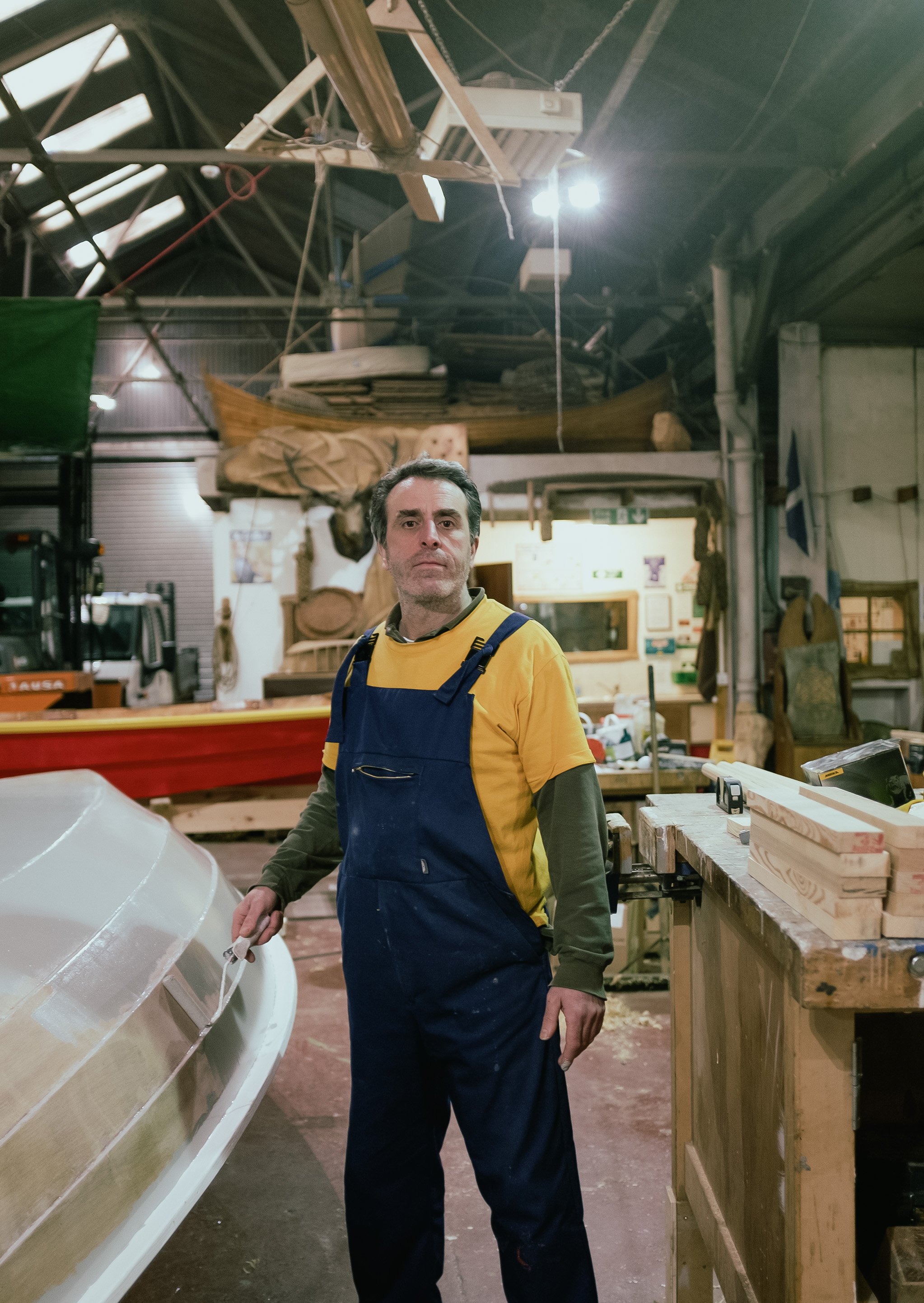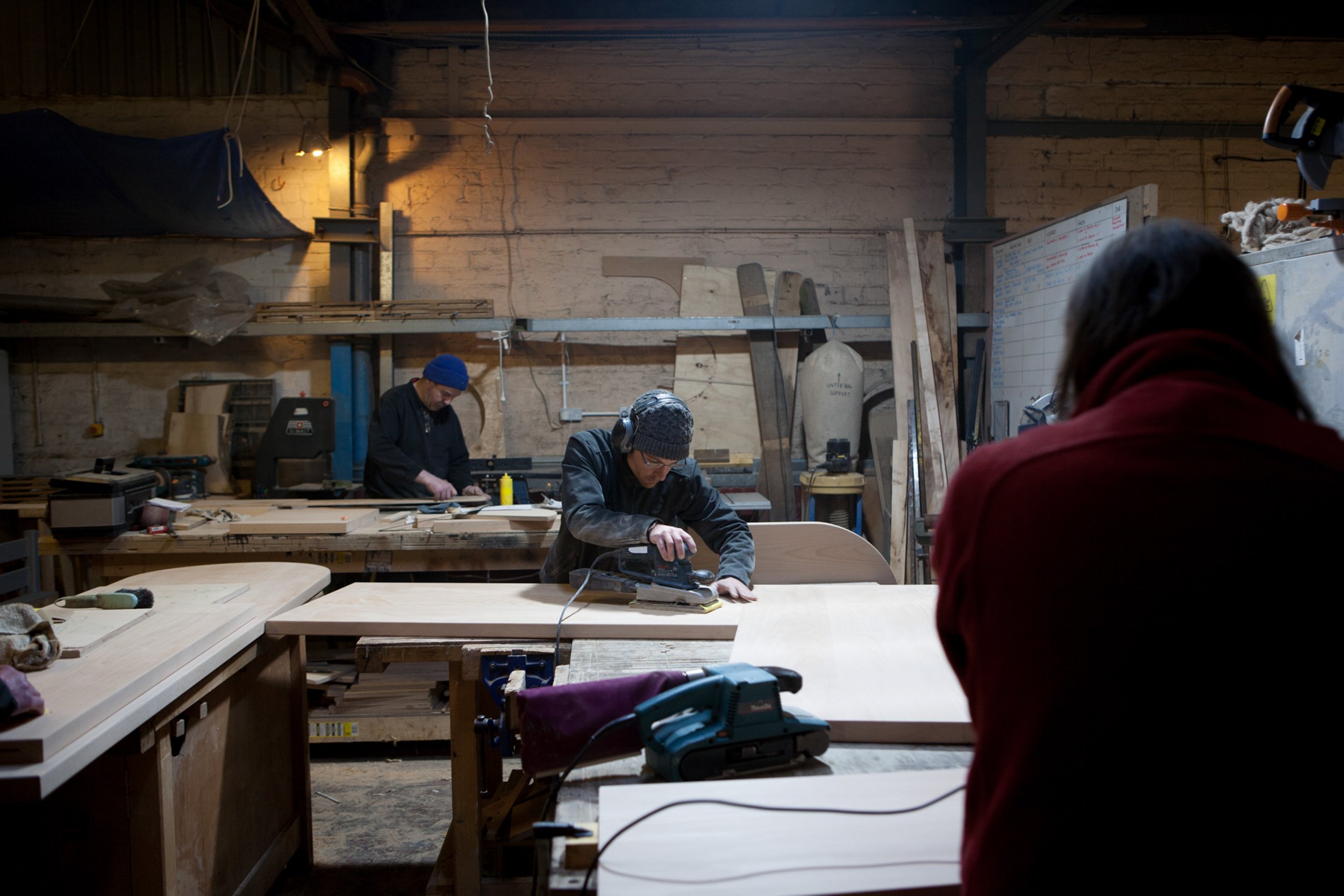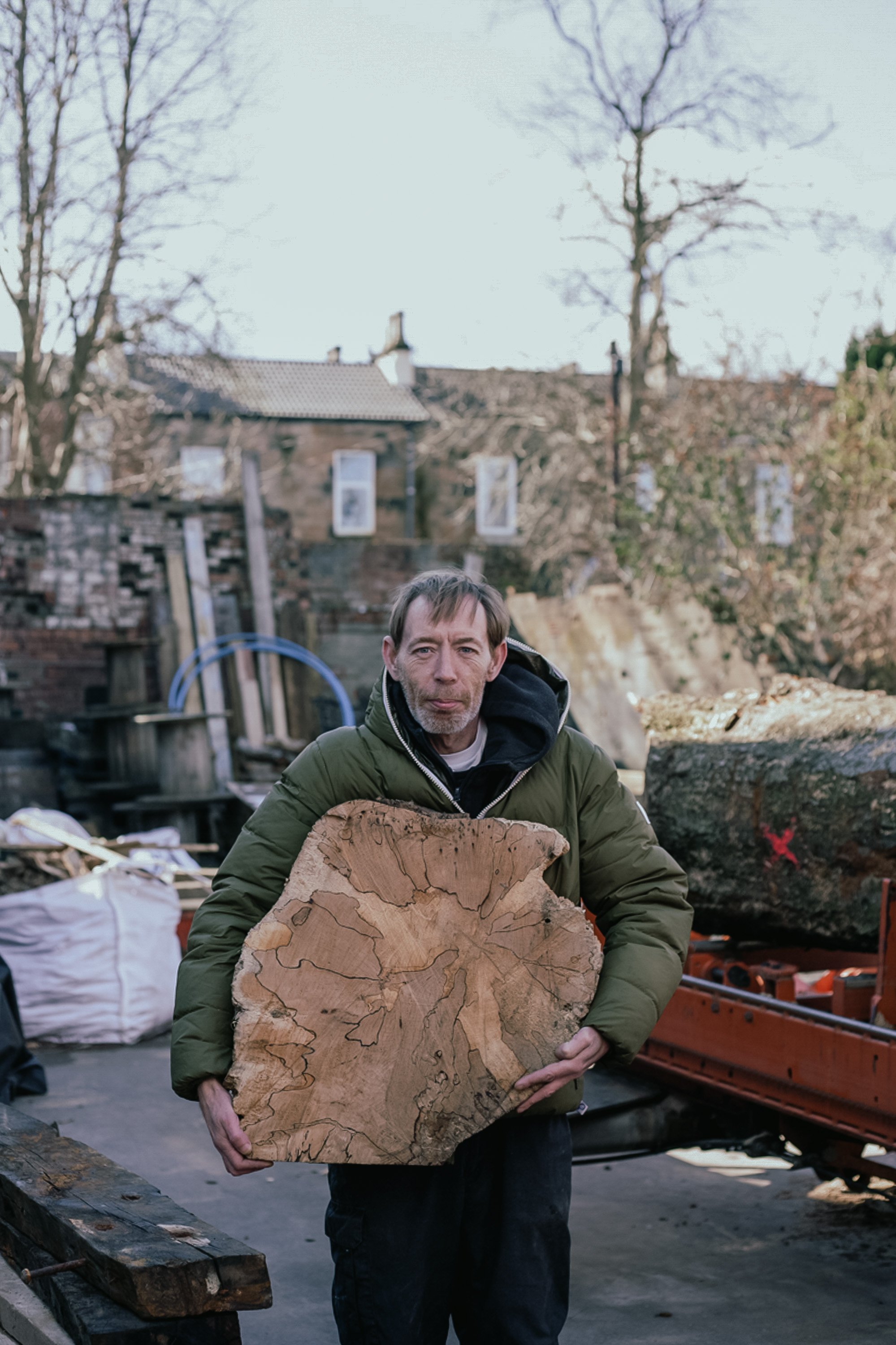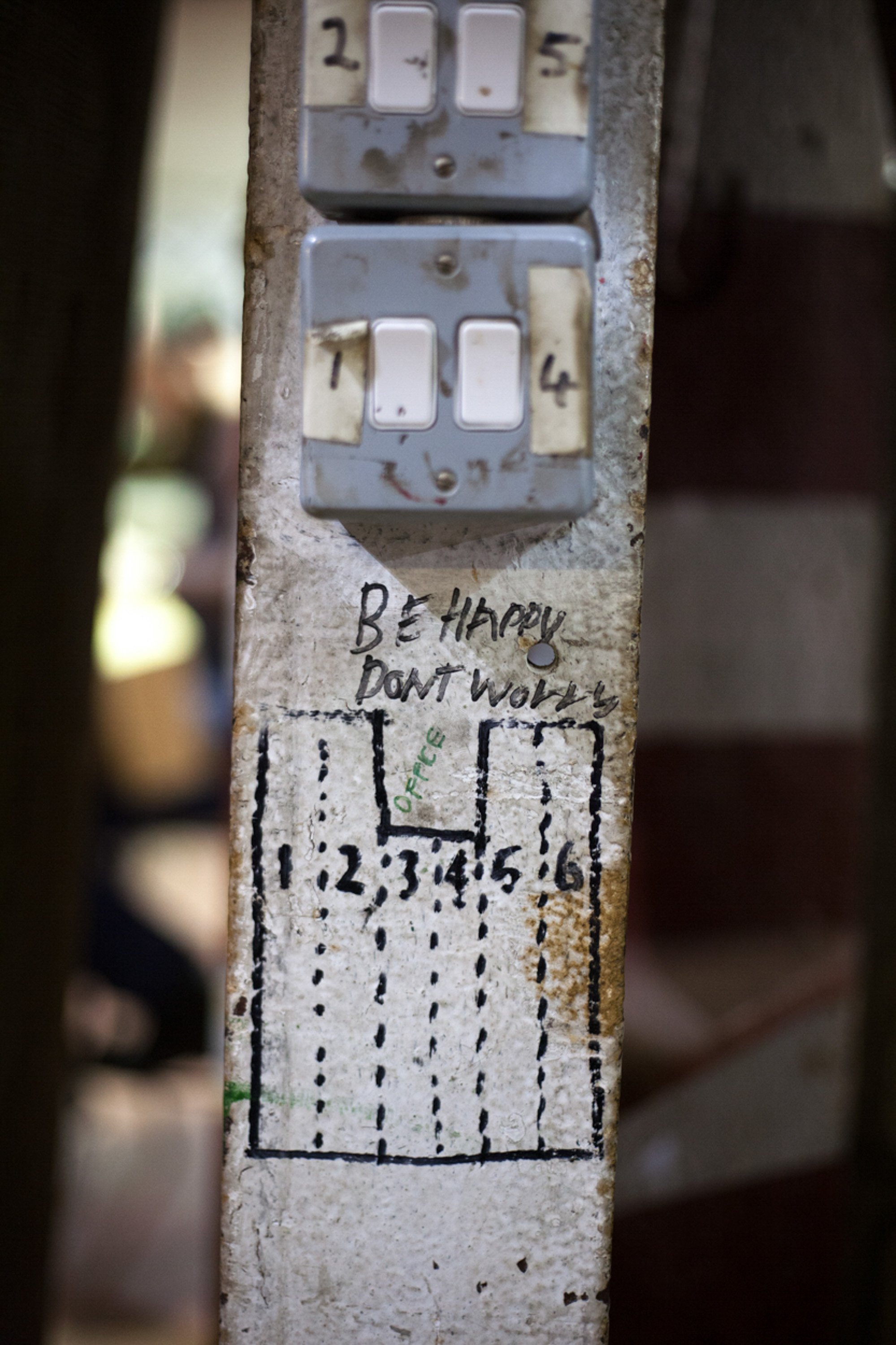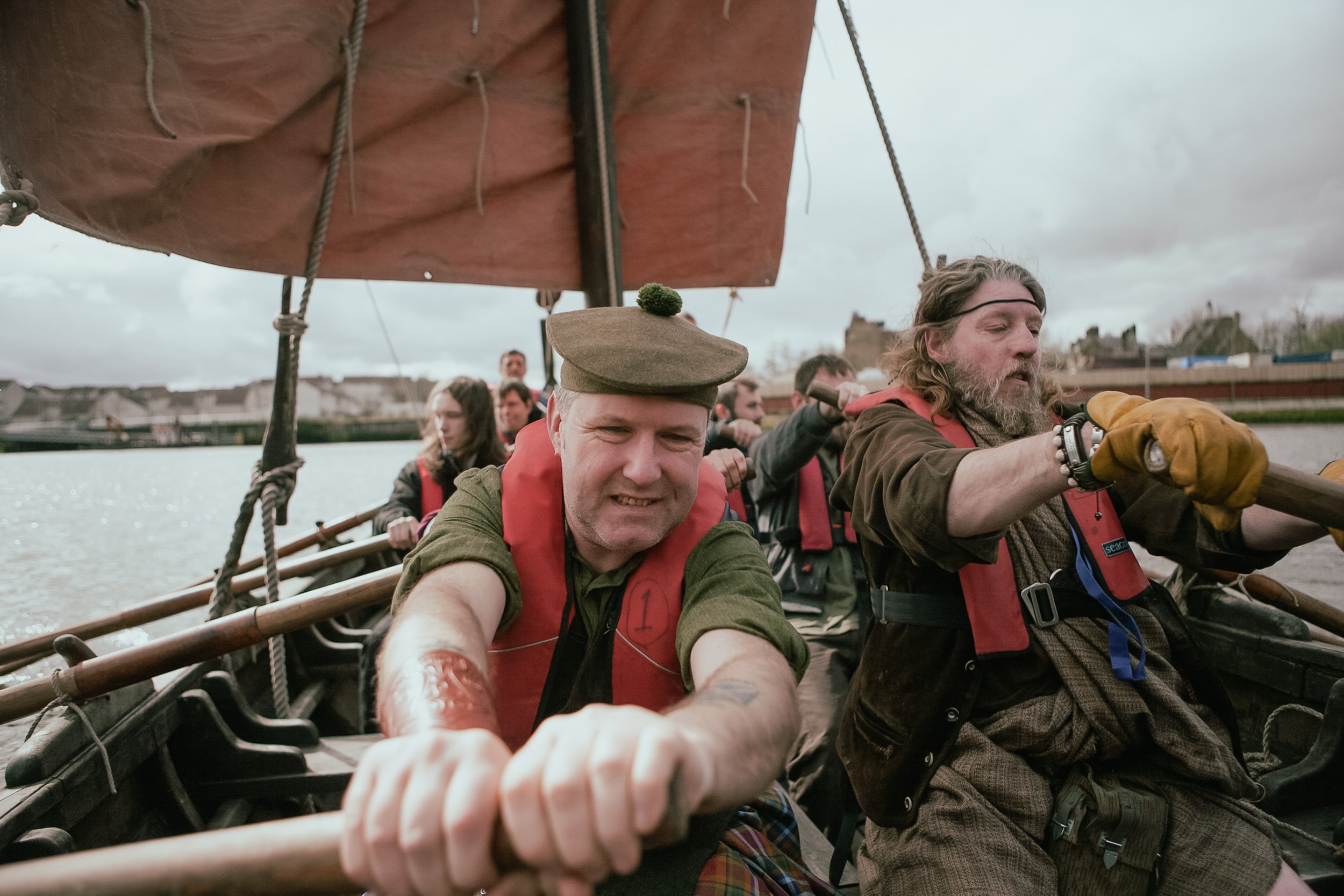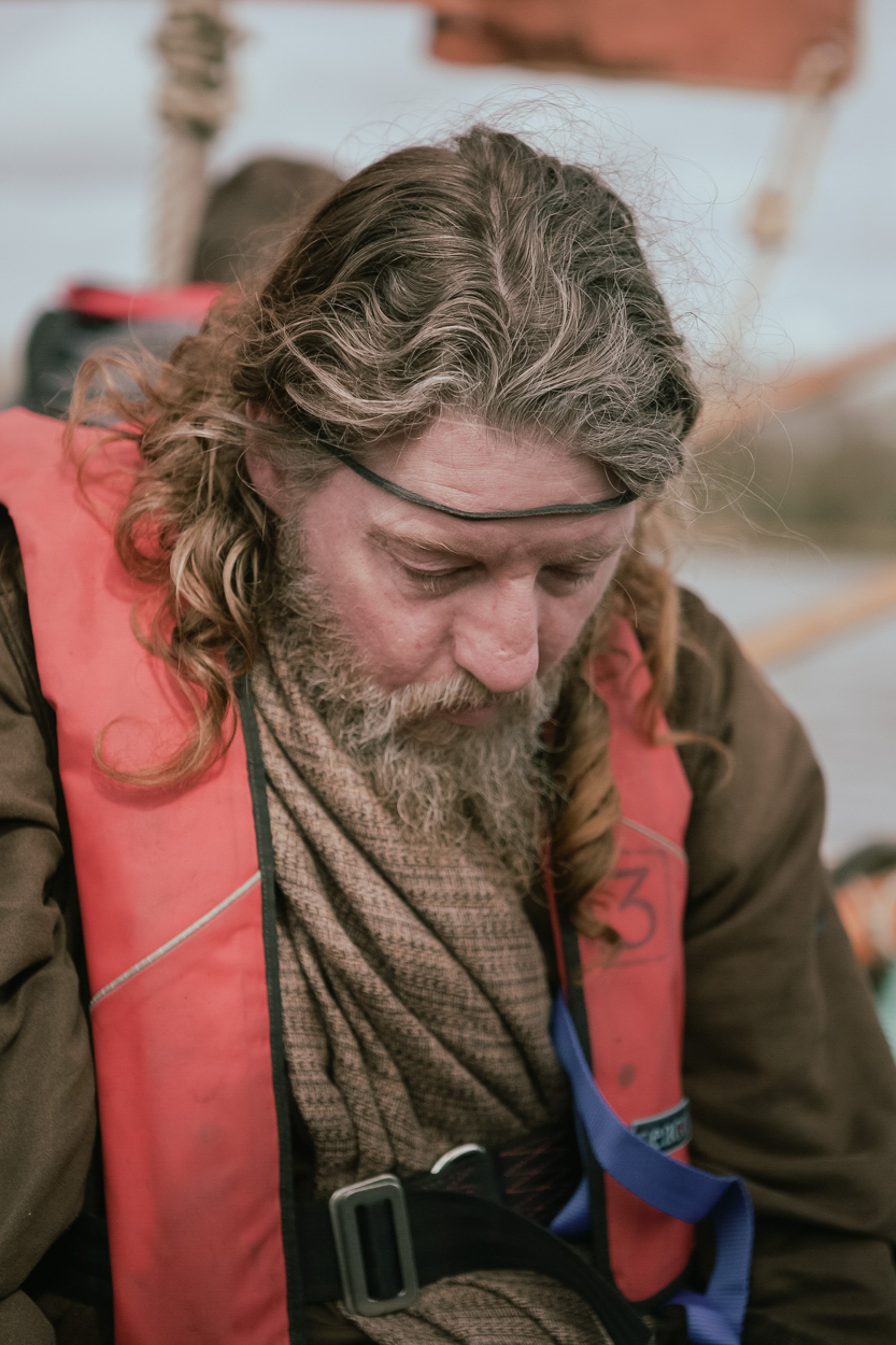
The Galgael
On a quiet dockland street in Govan, Glasgow, not far from the banks of the Clyde, a wooden boat is slowly sanded smooth to the sounds of local radio. The workshop belongs to the Galgael Trust and it’s through these doors that over 1000 of the city’s most marginalised have come to learn to work with wood, build boats and be part of a wider family, a clan even.
At a workbench, a Scottish flag is tied to a girder above where local man Rowan Mykytyn, 36, works away at his bench. He tells me
‘Before I was doing this I was long term unemployed, I slept til late in the day, I didn’t have any motivation. I was going for jobs via the job centre, a lot of them were soul destroying. Here nobody judges me. I came here as a volunteer, learning how to carve wood. I realised that I loved hands on work. Other jobs seemed anti-social to me but coming here you’re almost forced to be part of a team. It’s the working together that really helps me. I am a quiet person who doesn’t usually talk too much but coming here I’ve really opened up’
The Galgael prides itself on it’s participants being able to see their work take shape, from start to finish. During my visit Rowan had helped finish a flat bottomed boat that was launched later that week. There was a sense of achievement and feeling of completion in the workshop.
‘I feel this place is a breath of fresh air, different to other places. I used to get stressed when people used to expect things of me, putting me under pressure, but here there is freedom but within a strict programme, they know that some people have problems. They encourage you rather than push you. All kinds of wood comes through here, we get mainly donations, and so all the boats we make are a mixture of woods. I’ve never worked with Rowan the tree, but they laugh here that my name is in more than one way perfect for a rowing boat builder’.
Set up some twenty years ago by visionary local environmentalist Colin McCloud, the Galgael has aimed to create a sense of togetherness, to create an idea of a people in one of the most deprived parts of Scotland. The aim from the start says Galgael leader Gehan McCloud was to create ‘not so much a charity, but a working community of creative people, supporting one another and through this creating bigger ideas as to how a better world might be. This is how we see ourselves’.
Early on the Galgael decided that building boats would be the perfect symbol for their ‘journeying together’ programme, a metaphor for the hope they were instilling back into the community and a nod to Glasgow’s shipbuilding heritage. They built their first boat with timber sourced from a local park in 1997 and from this were commissioned by a local addiction service to design a boat building programme for their clients who were on the road to recovery. The success of this programme revealed the healing powers of boat building and working with wood.
The trust has a special relationship with the Hebridean galley called a Birlinn, a sort of open top, clinker built wooden vessel with a single square sail and oars. This medieval vessel was the dominant boat form in the Hebrides for hundreds of years and the Galgael has built two of their own. Their flagship being the 32 ft Orcuan, launched in 2002.
…..
At a scheduled tea break in the workshop everyone sits together around a table, the chef makes soup and the kettle is boiled. For many on the training programme this will be their only proper hot meal of the day. Looking around I think how much this tea break could be at a shipyard. This is the great achievement, there is a sense of purpose, togetherness and labour. Referrals to the service come from addiction support services, mental health services, employment services, probation and social services.
‘Here we encourage an informal form of support. We aren’t documenting everything like some of the services that work with our participants. We don’t focus on the problems but on the positives. We see this as a more human form of support. People can express themselves freely without feeling they have to do this through a support worker etc..I know this as I used to work in those services’ says Dorothy Graham staff member at the Galgael.
On Thursday nights the Galgael opens it’s door to the community in what they call their ‘Open Workshop’. Staff volunteer their time and a hot meal is prepared, it’s contribution based and everyone gets to eat. People often volunteer their time to cook. Visitors will work at the work benches on wood work projects but there is also music, poetry and visiting guest speakers.
Galgael currently runs a six week wood working programme, starting with building small wooden boxes and learning different joints. The workshop’s walls are lined with carvings made by those who’ve been through the doors, like panels in a church, they are a hand carved reminder of the different stages and challenges each individual has faced on their own journey. These include relief maps of Scotland carved into sycamore, salmon and deer carved into cherry. At the front of the workshop items made by participants can be bought in the Galgael shop.
Johnnie Millar is working on a map of Scotland. He holds a mallet with his name stencilled across the top. ‘Poor health ended my working life’ he says. ‘Glasgow’s wealth was built on being the second city of the British Empire. There was generally a feeling that the wealthy wanted to leave a legacy, to put something back. The architecture that I’m interested in is a reminder of this. I think nowadays people don’t want to put something back, but maybe the Galgael is putting something into the community’.
Another participant tells me ‘This place saved my life, now I don’t mind saying that. I got into gambling, it took over my life. I had a breakdown. I used to live for Friday, to escape from the week. Now I live for Monday. The weekend is still tough but I am surviving’.
There’s a real feeling at the Galgael of reconnection, reconnecting with work, reconnecting with people, with nature and with a sense of belonging. Joe Coughlan who has been with the Galgael since last August 2017 summarised this well,
‘I’m originally from Drumchapel, I’m 38. I was doing community service and my probation officer referred me here. I just took to it, I started a six week training programme and from that just kept coming here and I’m here most days. I have learnt so much here. I completed the joints here in two days whereas it was taking others longer, I realised I was good at this. I’m making stuff non-stop, I made a couple of boxes and then sold them in the Galgael trust shop. People choosing my work over others gave me strength.
About two and half years ago I lost a family member and this lead to me going into depression and I was on the sick. I’d been in and out of jail a couple of times. I decided I needed to get out the house and find work, it was a bit hard with my record and jobs are scare but here they took me in. I’m trying to look for a job that involves working with wood. The trust has been helping me achieve that.
I got so into this type of work that I’ve been working on some items at home, some carvings of my own. I’ve been working with white oak, spalted beech, and purple heart wood. It feels great to make something, for example I made a lamp from a laburnum branch. I love that lamp, it has brass fittings and has been varnished. When I see it in the corner of my room it feels great. I like wood you know, its warm. Stone is cold but wood is warm.
My favourite wood is purple heart, a tropical hard wood. Of the Scottish sourced wood I like larch as it’s good for building boats, which I love. Scottish pine too as it’s endangered. We need to bring this back in Scotland as it’s an icon.
Working here has given me a broader understanding of the environment. Where I grew up I was out a lot in the woods, in the fields. I’ve always loved it but then I found myself in the city. Coming here and working with wood has taken me back to the natural connection I had with nature in my youth. I know this as I love the smell of wood, I am always smelling the wood to identify it and people think I’m crazy, they say ‘its just wood!’ but I love it’.
…
The River Clyde is at low tide on a Monday morning in spring. Stood on the pontoon are the crew of the Orcuan, most dressed in tartan, kilts, one holds a battle axe and another a sword. High above us a group of school children wave to the crew amazed at the sight of the warriors sailing down the river.
Orcuan is heavy and sturdy, built using traditional methods with wood sourced from the city of Glasgow’s parks through a deal with the local council. There’s a great coming together of local people, local wood, heritage and enjoyment. Through team work the crew build trust, many of whom have been facing mental health battles of their own are out here rowing together and breathing fresh air.
Every week a crew will meet to sail the Orcuan under the guidance of volunteer skipper’s Glenn and Ian. For me the process seems almost sacred as the boat pushes off from the quayside. Rowing out in the dead calm of the Clyde, the sun bouncing off the gentle wake, silent but for the creek of the boat, there is a sense we are taking part in something ancient. Alongside us is Govan Old Church, a site home to very early Viking settlement on the river. The crew are conscious that they are sailing a boat built by their friends and in some cases their families. For some the journey on the boat is a huge step. One crew member tells me that he has just left hospital after a year receiving treatment for his mental health. The journey on the Orcuan has brought him out for the first time, mixing with people. Beneath the jokes and banter of the crew there is a huge sense of significance in sailing this boat for all involved.
Vic Brown is crewing the boat that day with her son Elliot. She has been involved with the Galgael for five years and can always be found at their workshop. Her son is involved in sailing the Orcuan.
‘I started Galgael five years ago now, hundreds of folk have been through here. I was in the Gorbals, living twenty floors up, I was having a bad time. People here reached out and grabbed me and got me on their programme. For lots of people it’s a distressing time now, the great thing about the boat is that the boat brings everyone together. People look after one another here, maybe its because there is love here and people are treated with respect. I get very angry when people are not being good to one another and that behaviour doesn’t fit in here. The love here is tangible. I have always had my problems, up and down, but as soon as you come through the front door you feel protected. The boat is magic.
I am an artist. I’ve been doing commissions’ here and there and making things for the Galgael too. I am more confident now as I’ve got my work in an exhibition in a café. Being here makes people feel hopeful about life. A lot of people who are here would be dead if it wasn’t for Galgael. It brings the good out in folk. If it wasn’t for this and the boat, I’d be were I was for twenty years, alone and stuck in a flat.
When I am in the boat rowing, I am focused on the moment. I have a task. It helps me. I would like to be able to make my own stuff, to make things, it’d be good when people come here if they seen the beautiful things, the talent here and not solely the problems.
The best people I’ve ever met in my life are the people here. I would have previously been lonely, I went with my son on the first trip with Galgael to Iona and from there I haven’t felt lonely. I met my partner through here, I’m happy. My son is involved with the boat rowing too, he loves being with some of the men who have been a constant in his life for the last five years. This is what is needed I think, a constant.’
